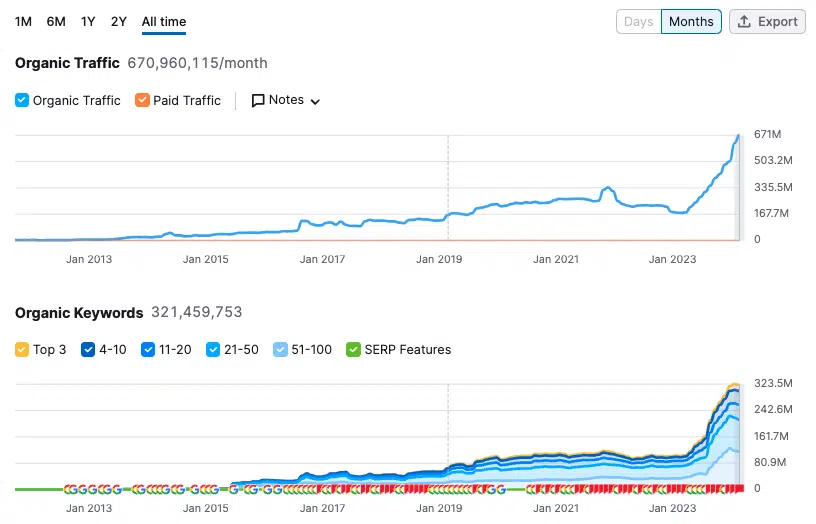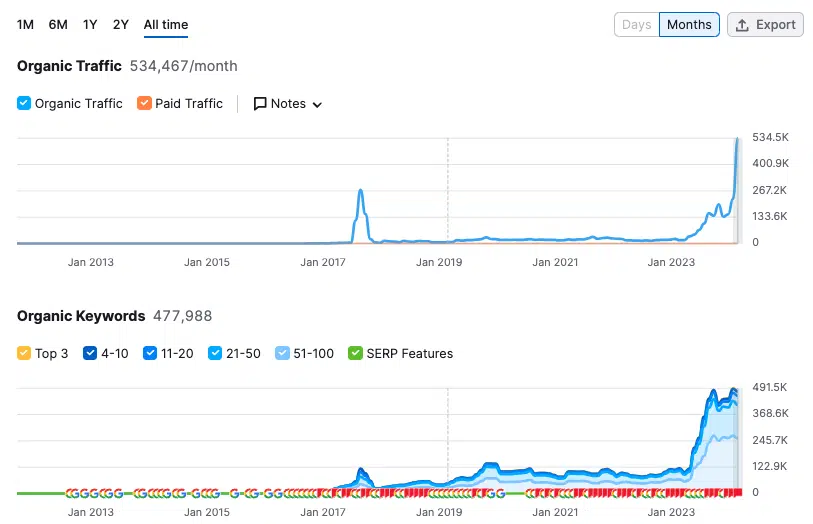If you own a niche site, there’s a pretty good chance that you saw something like this happen between late 2023 and today.
This is Semrush’s report for one of my own niche sites.
There’s not much to brag about these days on my site, but in 2022, there was. Google loved it. I ranked in the top 10 on my niche keywords and a wide range of related head terms.
I was pulling in a few hundred dollars a month in affiliate revenue – not exactly money I could retire with, but certainly enough to incentivize me to continue to work on my site.
How did I do it? I simply followed all the rules of white-hat SEO.
- I chose a niche topic that no one else was covering very well.
- I chose keywords that people were truly interested in.
- I made sure that my information was original, up-to-date and accurate. I researched every article I wrote for weeks, sometimes months. When I checked the sites ranking alongside me in the top 10 on any topic, my content was always far superior to all of theirs.
- I published frequently.
- My users loved my content. My comments sections were active and my site was shared on social media. I received a lot of compliments from people telling me they’ve been looking for a site like mine for years.
And then it all came crashing down.
My niche site still ranks on extreme long-tail terms, but it’s lost just about all visibility for head terms. And my affiliate revenue is down to pennies.
What happened?
The long-tail shift from niche sites to user-generated content sites
You’ll hear a lot of speculation about what happened, but this report from Sistrix tells you all you need to know.
After the November 2023 core update, Reddit’s organic visibility increased by 23%. Quora’s organic visibility increased by 15.9%.
That is just the tip of the iceberg. In 2023, Reddit’s organic traffic increased by a whopping 253.3% between July 2023 and June 2024, according to Semrush.
Similarly, Quora’s organic traffic increased by 133.4%. The number of organic keywords that both sites ranked on increased by a similar margin.

Other sites with user-generated content (UGC) also saw huge increases in the last year or two. YouTube saw an increase of over 450% in organic keywords.
You’ve probably seen for yourself for any kind of “how to” search that YouTube videos occupy an increasing amount of positions in organic search.
Amazon’s Alexa Answers site saw an 813% increase in SEO traffic before someone at Amazon decided to put a robots.txt exclusion, likely to keep their public content from being scraped to train other LLMs like Google Gemini (good luck with that, Amazon).
A typical Google SERP today
Here’s an example of a typical SERP today for a recent search I did. (For context, my 8-year-old daughter has recently gotten me hooked on playing Minecraft with her.)

A few years ago, you might have seen at least one or two accounts from independent bloggers.
No more.
Now, YouTube results take up the effective above-the-fold space that the first few organic results used to occupy.
The rest of Page 1 consists of user-generated content on well-established forum sites or well-known media sites.
Independent bloggers are pretty much wiped out, even though their content is arguably more accurate, more detailed and written with more expertise and zeal.
Dig deeper: How to survive and thrive in a Google helpful content world
Why is Google favoring sites like Reddit and Quora?
There’s a lot of speculation as to why Google is suddenly favoring forum sites. Since this is an opinion piece, I’ll share mine:
This is Google crying uncle.
For years, Google claimed that it could distinguish between good content and poor content. Every time there was a core algorithm update, they’d repeat the mantra, “Just produce E-E-A-T, and we’ll figure it out.”
Here’s the problem.
Let’s say I spend 10 hours every day researching a topic, writing and publishing content.
While I’m doing this, hundreds of unscrupulous publishers are scraping my original content, using AI to rewrite it and publishing it as their own – perhaps even using others’ content to improve on it.
They’ll do it all in a way that I can’t issue a DMCA takedown (nor even realize what they’ve done).
We’re entering a world where “expertise” and “experience,” particularly for head terms, will be so commoditized that it’ll be practically impossible for Google to discern them independently.
We all saw the recent leak of Google’s ranking signals. One thing that immediately struck me when I went through that list was how easily so much could be faked.
This is forcing Google to place greater emphasis on “authority” and “trust,” even at the expense of everything else.
I don’t know any industry expert who would cite sites like Reddit or Quora as authorities on their topics of expertise.
Why is Google favoring them so much?
It all goes down to a new “A” word: authenticity. For all their flaws, when you go to a site like Reddit, you know you’re seeing real conversations from real people.
Sure, you may need to take the scenic route to get to an answer, but the power of the crowd – along with platforms that foster free and open speech – usually gets you there.
The most powerful LLM won’t be the one with the best technology; it’ll ultimately be the one that is trained on the most useful data.
That’s why Google paid $60 million for access to Reddit’s data, and assuming Reddit can continue to collect high-quality content, Google probably got a bargain.
How Reddit and Quora have succeeded where others failed
One question I hear often is, why doesn’t Google just build its own forum powered by crowdsourcing?
Well, they tried. Hard.
Do you remember Google Answers (2002), Google Questions and Answers (2007) and Google Question Hub (2019)? Yeah, neither does anyone else.
These were desperate attempts by Google to use crowdsourcing to build its own library of knowledge.
The lesson they learned is that people don’t come to Google.com to give answers; they come to get them.
Some old-time SEOs might remember that Yahoo Answers was once a darling of Google organic search, but as Yahoo lost its way, so did Yahoo Answers.
By the time it was dissolved in 2012, it was a cesspool of spam and fake accounts.
Not coincidentally, around this time, sites like Reddit and Quora were taking off. How have these sites succeeded where others failed?
- They screen for real humans. Sites like Yahoo Answers and Google Question Hub died a slow and painful death because they were unable to keep spam and fake accounts in check, eventually losing all of their trust and credibility. Google essentially ended up outsourcing the task of figuring out how “human” content is to other companies.
- These humans have real conversations. Users on these sites are encouraged to engage in open and transparent conversation and dialogue. This opens up nuances and details of a topic that might otherwise not be covered on a site with static content. From a search and AI perspective, that opens up the extreme long tail that no one is covering.
- These conversations use real words. On forum sites, you can always be sure that users are using words that your audience uses because they are the audience.
- They’re constantly self-moderated. Sites like Quora and Reddit don’t employ hundreds of moderators who constantly monitor every conversation. Instead, they create communities that self-moderate. For example, each subreddit has its own set of rules; if a user breaks a rule, both the moderators and the users themselves will quickly call that user out.
Get the daily newsletter search marketers rely on.
If you can’t beat them… beat them
Reddit and Quora have done many things well, but they aren’t perfect.
The biggest flaw in both of them is the same as their biggest strength: they’re both targeted toward a mass audience. This results in wildly inconsistent quality from one topic to another and one conversation to another.
Here’s the advice I give to every brand, large and small, that wants to be competitive in five years: Start your own discussion board or forum focused specifically on your industry niche.
Granted, you’ll get a lot of eye-rolling from people saying, “We tried that 10 years ago.”
But the world – and the cost-benefit equation – is much different today than it was then.
Ten years ago, a well-designed forum might get you some organic rankings on the extreme long tail. However, whatever revenue came out of that traffic couldn’t justify the cost of screening users or moderating and maintaining content.
Today, from a cost perspective, you can bet that forum application developers are working hard to incorporate AI into their software to drive costs down.
Tasks like screening users and moderating forums have traditionally required cumbersome manual work, but they are well in the wheelhouse of what AI can do.
As for the benefits of maintaining your own forum, there are lots more today than there were then:
- Google’s sudden predilection toward forum sites isn’t going away. That means that good forums will rank not just in the long tail but at the head as well.
- Through crowdsourcing, you can generate exponentially more high-quality content than paying an army of freelancers – at a fraction of the price.
- If you can be the one in your industry generating authoritative content from your most influential and passionate customers, AI LLMs will fall over themselves to learn from the kind of information that your community is creating.
All of these benefits will happen only if you design and run your forum correctly.
Follow the best practices above
Have zero tolerance for fake accounts, overt promotional content and spam.
Follow the “broken windows” theory – if spam is allowed to fester on a given post for more than a few minutes, that’s too long.
Focus on your specific audience
Do what sites like Reddit and Quora can’t do: be laser-focused on your audience.
The more precise, the better.
“If you build it, they will come” doesn’t apply here. You need to put yourself in your audience’s shoes and ask, “What’s in it for me?”
You are asking them to spend their time and effort visiting, reading questions and writing answers. What are the benefits they’re getting in return?
Here’s where you need to be creative.
- Do you allow a certain amount of self-promotion for users who consistently provide value to discussions?
- Do you do partnerships with well-known influencers in your industry?
- Will your audience be incentivized by aspirational intangibles such as “your expertise will help others”?
- If you operate a marketplace of some kind, can you provide greater visibility for those who contribute content?
- Can you gamify the experience to make it “fun” to see and be seen?
Dig deeper: SEO for user activation, retention and community
Provide definitive answers to the most common questions
Your customer service team can rattle off a list of the most common questions people ask, both branded and unbranded. Seed your forum with these questions (and when people ask the same questions, dedupe them).
Encourage open and transparent conversation, even if it’s about a touchy subject. If they aren’t having the conversation on your site, it’s happening somewhere else.
Go deep
Seed your forum with interesting questions you’re seeing on other forums or in search data, especially on hot and trending topics. Have your internal experts engage in the conversation as fellow enthusiasts and helpers.
Create an environment where your community’s conversations are richer and deeper than those at Reddit and Quora – to the point that users on those sites are citing the information they found on yours.
Make it the place the leaders of your industry want to come to be seen
There aren’t many experts who care to “be seen” on Quora or Reddit. If you can attract the top names in your industry (many of whom are probably your existing clients and customers) to view your forum, that makes it a lot more appealing for other influencers to take notice with an acute case of FOMO.
Own conversations about your own brand
If you’re a relatively well-known brand, try this experiment. Google the name of your brand + the word “Reddit.”
Read the kinds of conversations going on about your brand. Then ask yourself: Why are these conversations going on on Reddit and not your own site?
The answer is almost certainly that they trust the Reddit community to give answers that are more helpful, transparent and insightful than anything your company provides. Fix that.
HubSpot is a good example of a brand that has successfully built an active community in its niche.
Here’s what organic traffic and keywords to their forum look like.

While the organic search traffic levels are a fraction of their overall traffic, it looks like they’ve been pretty successful in hedging against the loss of traffic to their blog that we’re all experiencing with UGC on their forum, following most of the best practices outlined above.
Interestingly, HubSpot’s forum looks much the same as it did when it started seven years ago, during the initial forum boom.
But as the economy soured and companies looked for places to cut, these were often first on the chopping block, citing too much cost for too little benefit.
American Express and Home Depot used to have popular discussion boards and probably wish they could have some of that long-tail goodness back.
Companies that stuck with their forums and grew them will find themselves in an enviable position as AI becomes thirsty for deep content.
Your ultimate goal: Make Google look silly
This is my conclusion to everyone who has seen their niche site plummet in the rankings in 2023. Make Google look silly.
If you’re a niche site and you’ve seen your rankings plummet, it’s not time to give up. Instead, double down on establishing yourself as the authority on your topic.
- Go onto forums like Reddit and Quora and offer your expertise (keeping it concise, helping their users, but pointing readers back to the most helpful content on your own site).
- Start a discussion forum of your own and attract a group of fellow enthusiasts to maintain it.
- Cover your topic with more enthusiasm, insights, and accuracy, which will make conversations on Reddit and Quora look like child’s play.
Simply put, everyone who has grown reliant on Google for organic traffic needs to face facts. The gravy train is over.
Our number one job should be to run our sites in a way that delights users and explores aspects of our topics in new and different ways – which is what we should have been doing all along.
You want your site to become so authoritative for your topic that it’s cited on Reddit, Quora, social media, AI and anywhere else people research your topic.
If Google figures it out and starts ranking you again, great. If they don’t, you’ll still be fine, but they’re the ones who’ll be in trouble.
Contributing authors are invited to create content for Search Engine Land and are chosen for their expertise and contribution to the search community. Our contributors work under the oversight of the editorial staff and contributions are checked for quality and relevance to our readers. The opinions they express are their own.








